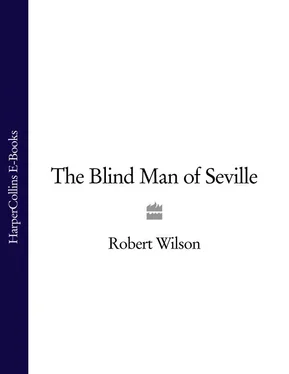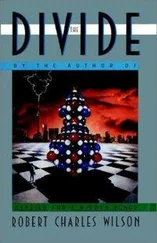‘The light changed,’ said Ramírez.
‘The shadows moved,’ said Falcón.
‘I didn’t let anybody in,’ she said slowly. ‘It happened just as I told you.’
They terminated the interview just before 16.30. Falcón sent Ramírez off with the girl to find a policewoman to supervise a pubic hair match with the Policía Científica. As they left he heard Ramírez talking to her as if she were an old friend and they were heading for a cervecita except the words were different.
‘No, I tell you, Eloisa, if I was you I’d drop the guy, drop him like a hot rock. If he can kill a guy like that he can kill you. He can kill you without feeling a damn thing. So you watch yourself. You get any suspicions, any doubts, you give me a call.’
Falcón went to his office and called Baena and Serrano to see if they’d found any witnesses outside the Edificio Presidente. None. Few people around. Shops closed. Most of the locals in the centre of town for the processions.
He hung up, cracked his knuckles one after the other, a habit that Inés had loathed but it was an unconscious act, something he did to steady his brain. It had made her writhe.
Falcón called Comisario Lobo, who told him to make an appearance in his office. On the way to the lift he saw Ramírez and told him to get the paperwork ready for the meeting with Juez Calderón. He went up to the top floor. Lobo’s secretary, one of those minimalist Sevillanas who reserved all her extravagance for after office hours, sent him in with a flick of an eyelash.
Lobo was facing the window, hands behind his back, doing knee bends while he took in the greenery of the Parque de los Príncipes across the street. He was short and stocky with large, hairy agricultural hands. He had a bull neck and grey, industrial hair. He’d always worn heavy black-framed glasses from a lost era until last year when his wife had persuaded him into contact lenses. It was an attempt at image improvement which had failed because his eyes were the colour of mud and the lack of frames had made his nose look more hooked, revealing more of his brutal face than most wanted to see. He had thin lips, which were only two shades darker than his cumin complexion. He looked more criminal than most of the people in the holding cells, but he was a good manager and a direct talker, who always supported his officers.
‘You know what this is about?’ he said, over his shoulder.
‘Raúl Jiménez.’
‘No, Inspector Jefe, it’s about Comisario León.’
‘He was in the photographs in Jiménez’s study.’
‘Who was he in bed with?’
‘They weren’t those sort of …’
‘I’m joking, Inspector Jefe,’ said Lobo. ‘You probably saw a lot of other funcionarios in those photos.’
‘Yes, I did.’
‘Did you see me?’
‘No, Comisario.’
‘Because I’m not in them, Inspector Jefe,’ he said, walking quickly to his desk.
They sat down; Lobo clasped his hands as if about to crush small heads.
‘You weren’t here at the time of the 1992 Expo?’ he said.
‘I was in Zaragoza by then.’
‘A very different situation existed here at Expo ‘92 than at the Barcelona Olympics. There, I’m sure you will recall, the Catalans made a profit. Whilst here, the Andalucians made a staggering loss.’
‘There was talk of corruption.’
‘Talk!’ roared Lobo savagely. ‘Not just talk, Inspector Jefe. There was corruption. There was so much corruption that if you weren’t making millions it was an embarrassment. Such an embarrassment that those who hadn’t managed to stuff their pockets went out and hired Mercedes and BMWs to make it look as if they had.’
‘I didn’t realize.’
‘And it wasn’t just the locals. The Madrileños were down here in force, too. They could see a certain attitude was prevailing. A slackness. A lack of attention to detail that could be financially exploited.’
‘How is this relevant ten years later?’
‘Do you remember how many people were brought to book over that?’
‘I don’t recall, Comisario.’
‘None!’ said Lobo, whacking the desk with his clasped hands. ‘Not one.’
‘Hermanos Lorenzo,’ said Falcón. ‘Construction.’
‘What about them?’
‘Raúl Jiménez had a business relationship with them, which terminated in 1992.’
‘Now you’re beginning to understand. Raúl Jiménez was on the Expo de Sevilla Committee. He was on the board of directors responsible for the development of the site. Hermanos Lorenzo was not the only construction company he was connected to.’
‘I’m still not sure how this can be relevant to his murder nearly ten years later.’
‘Possibly it isn’t. I doubt there will be any connection. But you’ll be stirring up the shit pot, Inspector Jefe. Nasty things will come to the surface.’
‘And Comisario León?’
‘He doesn’t want any unpleasant surprises. You must tell me if you come across “sensitive” information and … no leaks, Inspector Jefe, or we’ll all be broken on the wheel.’
Another reason why Lobo’s men liked him was his unique ability to help them understand the seriousness of a situation. Falcón got up to leave, headed for the door knowing that there was something else, that Lobo always liked to spring things on his men as they were leaving. It made a more lasting impression.
‘You probably thought, with all your experience in Barcelona, Zaragoza and Madrid, that your application to a second division murder city like Seville would be well received.’
‘I don’t take anything for granted, Comisario. Politics plays its part in every appointment.’
‘I had to work very hard on your behalf.’
‘Why did you do that?’ he asked, Lobo unknown to him before he arrived.
‘For that very unfashionable reason that you were the best man for the job.’
‘Then I thank you for it.’
‘Comisario León was a great admirer of the tenacious talents of Inspector Ramírez.’
‘As am I, Comisario.’
‘They keep in touch, Inspector Jefe … informally.’
‘I understand.’
‘That’s good,’ said Lobo, suddenly cheerful. ‘I knew you would.’
Thursday, 12th April 2001, Edificio de los Juzgados, Seville
‘I think Eloisa Gómez let him in,’ said Ramírez as they crossed the river.
‘Baena and Serrano haven’t got anybody outside the Edificio Presidente,’ said Falcón. ‘And I prefer that scenario to the killer climbing up the lifting gear and hiding in the apartment for half a day, even though it was empty apart from a short visit from Sra Jiménez. Was the girl scared?’
‘Didn’t say a word to me after we finished the interrogation.’
‘Does she believe us?’
‘Who knows?’
The Edificio de los Juzgados was next to the Palacio de Justicia, just opposite the Jardines de Murillo. It was well past five o’clock when Falcón and Ramírez parked up at the back of the court building. Falcón, who hated to be late, wanted to break the comb that Ramírez was putting through his black, brilliantined hair into ten little pieces. His murderous glare had no effect on the Inspector, who considered that they were early and his coiffure a priority — there could be secretaries about.
The two men in their dark suits, white shirts and sunglasses went to the front of the dull grey building — the monochrome of justice in the garden city. They put their briefcases through the X-ray machine and showed their ID. The place was quiet; almost everything happened in the morning. They went upstairs to Juez Calderón’s office on the first floor. The building was dark, even grim, on the inside. Nothing pretty about justice even when it was good and true.
Читать дальше












